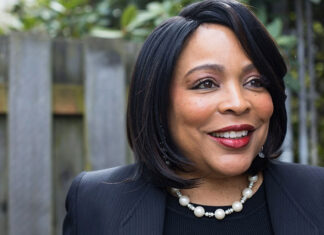Special To The Seattle Medium
Jannine Young had been a healthy athlete her whole life. She played basketball for the University of Washington. While in the Air Force she played for the All-Air Force basketball team. Then she won a gold medal in the World Masters Games.
But like many others, Young found herself facing health problems about 12 years ago, at age 45. Out of nowhere she was diagnosed with diabetes. Diabetes is the largest single cause of kidney disease. Young was well aware of this connection because her sister, Dr. Bessie Young, helped create Northwest Kidney Centers’ Kidney Health Fest for African American Families. This knowledge helped Jannine Young know she had to take action.
“It was just my annual physical and the doctor did a blood draw and called me up and said my blood sugar was around 300 and I’d been having other symptoms,” Young said recently. “I’m super athletic and always had a healthy diet. My doctor immediately put me on insulin to get my blood sugar down. For three months I was giving myself a shot twice a day.”
Now Young’s diabetes is under control. She takes medication every day and watches her diet. Young also retired from her high-pressure management job with the U.S. Postal Service and now teaches yoga in Ballard.
On June 22, 2013, she will teach a beginning yoga class at Northwest Kidney Centers’ Kidney Health Fest for African American Families. The free Fest, aimed at educating the community about kidney disease, runs from 9 a.m. to 2 p.m. at Van Asselt Elementary (formerly the African American Academy), 8311 Beacon Ave. S., in Seattle.
It includes free health screenings from 9 a.m. to 1:30 p.m., an educational program from 10 a.m. to noon, lunch at noon, and entertainment and information throughout the day.
Participants will not only get a chance to meet Young, but will also be offered free health screening tests like the one Young had 12 years ago that alerted her to her diabetes. The health tests include a blood test, urine test to determine if there is excess protein in the urine (a marker of kidney disease) and a blood pressure screening.
“Everyone is welcome to attend the Fest, have fun and learn about kidney disease and healthy living – and it’s completely free!” said Dr. Bessie Young, a Seattle kidney specialist who has chaired the community organizing committee since the Fest began 11 years ago. “People of every age can have fun while they learn how to keep their families healthy.”
One in seven American adults has kidney disease. In the African American community, the number increases four-fold. Although African Americans make up 12 percent of the U.S. population, 35 percent of individuals with kidney failure on dialysis are African American. In addition, African American men are 10 to 14 times more likely to develop kidney failure due to high blood pressure than Caucasian men in the same age group.
Jannine Young believes that everyone can change their lifestyle a bit to get healthier. When she learned she had diabetes, she changed her diet. “I cut out white rice, white potatoes, breads, pasta and I switched to brown rice and started to eat smaller servings,” she said. “I always have nuts with me, cut up apples, peanut butter. I eat more healthy snacks.”
Exercise – any kind – is also important, she said. While she worked for the postal service, Young taught a 10-minute yoga stretching class to her co-workers. Then she started a yoga class for her neighbors in Seattle’s Blue Ridge neighborhood. Every little bit helps, she said.
“Exercise and healthy eating is doable by anybody. Exercise simply is walking. It doesn’t cost anything. Learn what foods not to eat. Cut down empty carbs, get rid of sugars. Eat more vegetables. Read labels. Be more focused on what you put into your mouth,” Young advises.
Participants in the Kidney Health Fest for African American Families can taste some kidney-healthy meals at a free lunch offered by local chefs. By participating in the Fest, trying Young’s beginning yoga class, enjoying a tasty lunch and going through the free health screenings, attendees can take the first steps to enjoying a healthier lifestyle.













